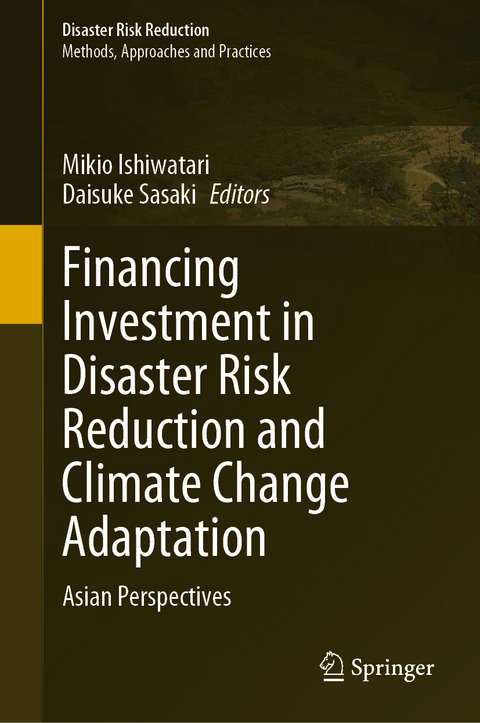
Financing Investment in Disaster Risk Reduction and Climate Change Adaptation
Springer Verlag, Singapore
978-981-19-2923-6 (ISBN)
To date, various international arenas have recommended increasing investment in DRR. The Sendai Framework for DRR, adopted by the UN member states in 2015 during the Third UN World Conference on DRR, emphasizes investment as a priority for decreasing disaster risks and losses. The Yangon Declaration set the goal of doubling investment to address water-related disasters. However, most countries are not able to proactively invest enough in DRR. Understanding the current scale and estimate of investment and its effects is crucial for promoting DRR investment, but such information and estimates are rarely available.
This book examines the current investment trends and issues in DRR and CCA. Based on specific case studies, field data and evidence, the book identifies challenges in increasing investment and recommends various investment policies and innovative approaches to sustainable progress towards a resilient future.
Chapter 12 is available open access under a Creative Commons Attribution 4.0 International License via link.springer.com.
Dr. Mikio Ishiwatari is a senior advisor on disaster management and water resources management at the Japan International Cooperation Agency, and a visiting professor at the Graduate School of Frontier Sciences, The University of Tokyo. He has been engaged in projects and research work on disaster risk reduction, climate change adaptation, and water issues. He led the formulation of the Japanese assistance policies of climate change adaptation and community-based disaster management. At the World Bank he worked as a senior disaster risk management specialist and published Learning from Megadisaster: Lessons from the Great East Japan Earthquake. He worked in various positions at the Ministry of Land, Infrastructure, and Transport, Japan, for 17 years, and was responsible for research and technology development as a senior deputy director for river technology and information. He also worked as an urban development specialist at the Asian Development Bank. He holdsa Ph.D. in international studies and an M.Sc. in urban engineering from The University of Tokyo. Dr. Daisuke Sasaki is an associate professor of the International Research Institute of Disaster Science (IRIDeS) at Tohoku University in Sendai, Japan. He holds a Ph.D. (2015) in international studies and also has expertise in disaster science. He has been continuously conducting research focusing on the factors that might hinder the resolution of regional issues from the perspective of international cooperation both qualitatively and quantitatively, and also engaged in plenty of international collaborative research with several universities in the Asia-Pacific region. Dr. Sasaki has published a number of articles in refereed journals including the International Journal of Disaster Risk Reduction (IJDRR), and he has served as a guest editor for several special issues of the Journal of Disaster Research (JDR).
Financing Investment in Disaster Risk Reduction and Climate Change Adaptation: Opportunities and Challenges.- Financing in Climate Change Adaptation.- Recent Trends in Disaster Risk Reduction Investments: A Literature Review.- Exploring people's perception of disaster risk reduction investment for flood management: the case of Jakarta floods in Indonesia.- Factors influencing climate change adaptation investment by local government units in the Philippines.- Financing Infrastructure of DRR: Possibility of integrating investments in maintenance and DRR.- Financing Climate-Resilient Coasts: Tracking Multilateral Aid for Ocean and Coastal Adaptation to Climate Change in Asia-Pacific.- Early Recovery in Humanitarian Response: In the Cases of Four Disasters in the Asia-Pacific Region.- Is the Post Disaster Needs Assessment Important to Investment in Disaster Risk Reduction and Climate Change Adaptation? Lessons from Indonesia and the Philippines Based on Literature Review.- Estimating the Benefits of Flood Protection-Reviewing the Transition of the Cost–Benefit Analysis Manual in Japan and the Implementation Status of the International Flood Protection Project.- Nature-based solutions for river restoration in Japan.- Future Perspectives of Financing Investment in Disaster Risk Reduction and Climate Change Adaptation.
| Erscheinungsdatum | 05.09.2022 |
|---|---|
| Reihe/Serie | Disaster Risk Reduction |
| Zusatzinfo | 30 Illustrations, color; 10 Illustrations, black and white; XII, 200 p. 40 illus., 30 illus. in color. |
| Verlagsort | Singapore |
| Sprache | englisch |
| Maße | 155 x 235 mm |
| Themenwelt | Naturwissenschaften ► Biologie ► Ökologie / Naturschutz |
| Naturwissenschaften ► Geowissenschaften ► Geologie | |
| Naturwissenschaften ► Geowissenschaften ► Meteorologie / Klimatologie | |
| Wirtschaft ► Betriebswirtschaft / Management ► Finanzierung | |
| ISBN-10 | 981-19-2923-8 / 9811929238 |
| ISBN-13 | 978-981-19-2923-6 / 9789811929236 |
| Zustand | Neuware |
| Informationen gemäß Produktsicherheitsverordnung (GPSR) | |
| Haben Sie eine Frage zum Produkt? |
aus dem Bereich


